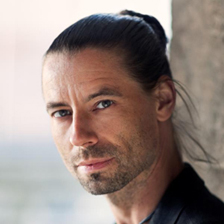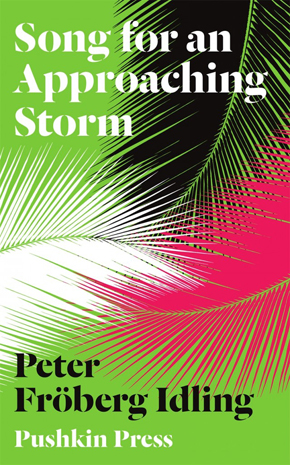The lovelorn dictator
by Peter Fröberg IdlingWhen one looks back on one’s life, it is often the smallest decisions that have had the greatest impact. Like the moment a colleague of mine showed me an ad for a job and said: “Look Peter, this is really you,” and I had to agree because for once I could match all the criteria without having to exaggerate or lie. Not that I wanted a new job, but it was fun to write such an application. This little whim, on a slow afternoon at the office, was to change everything. When I was subsequently offered a two-year contract as a legal adviser in Cambodia it was already too late for second thoughts.
I had never been to Cambodia, or even Asia, before my plane hit the tarmac of Phnom Penh’s airport in the autumn of 2001. And by the time the taxi from the airport sped through the star-filled night, I knew this was the adventure I had been unconsciously longing for.
Half a year later as I turned 30 I remembered a promise to myself from a decade earlier to write a novel before I reached that birthday. But I had been too lazy, unfocused, relying too much on a presumptuous idea of having talent. I realised that if I wanted to write anything other than articles, bad poems and unfinished short stories, I had to knuckle down, so I applied to a writers’ school and was admitted (presumably because most applicants were younger women and I filled a distinct quota).
While in Cambodia I had come across a peculiar little travel report. It was published in 1979 and written by four Swedes who had been invited by Pol Pot to travel through the country in order to counter persistent rumours of terror and genocide. After two weeks and 1,000 kilometres the Swedes emerged from the then hermetically closed country, home to the most radical revolution in history. Their account was not uncritical, but they found no proof of mass murder or repression. On the contrary, they witnessed a poor country struggling to rebuild itself after a devastating war.
Given the two years I spent in a society still deeply marked and traumatised by three-and-a-half years of Pol Pot’s murderous regime, I found their account incomprehensible. I wanted to find out how it had been possible for four well-educated Swedes, specialists in Cambodia, to travel through a genocide without seeing it. This urge became the starting point for my first book, Pol Pot’s Smile.
What was equally surprising was that only one of the delegates on the trip ever made a public apology for their report; the most famous of the others, the international intellectual Jan Myrdal, remained a stern supporter of the Khmer Rouge. My research took me back to Cambodia and the country’s most remote areas, but for every answer I found there were new questions.
Pol Pot was engaged to a younger woman of royal descent who left him and became the mistress of the architect of the election fraud. This double blow left him with no other company than his discrete friends of the forbidden Communist movement. The rest is history…”
When I started writing I realised I could not fit all this contradictory material into a traditional form. I ended up with 259 fragments or scenes, ranging from official documents to propaganda slogans, from poems to dreams I’d jotted down. It was a mess and it did not fit into any genre. But put together, the small scenes became a kind of mosaic that to me became the truest way to tell the story of the Khmer Rouge and their Swedish visitors.
I had no expectations when Pol Pot’s Smile was published in 2006 by a small independent publishing house, thinking the subject was too narrow for readers who did not have a special interest in Cambodia, and the book too strangely written for those few who had such an interest. It still astonishes me that the book became a small-scale bestseller, translated into seven languages and nominated for several prestigious international awards.
While researching the first book I came across a little anecdote that sparked my curiosity. According to a first-hand source, Pol Pot’s radicalisation had its origin in two things that happened in late 1955. Pol Pot was then in his early thirties and engaged to a younger woman of royal descent named Somaly. The same year she was selected as the first ever Miss Cambodia. In order to marry her, Pol Pot needed to scale the ladder of society, and the easiest way open to him was via a political career. He got involved in the Democratic Party, which seemed set to do well in the upcoming elections. But the ruling elite would not allow such a power shift and the Democrats were crushed. Somaly left him and became the mistress of the very architect of the election fraud. According to my first-hand source, this double blow left Pol Pot with no other company than his discrete friends of the forbidden Communist movement. The rest is history…
This sensational story turned out to be difficult to research. But as I was already fascinated by this intriguing and dynamic decade in Cambodian history, I decided to try to reconstruct the story and this lost world as fiction. Once again I went back to Phnom Penh, in order to find the documentary elements I needed to create a convincing literary universe – and to further explore this overlooked and seemingly trivial episode that would have such terrible consequences two decades later.
Another reason I wanted to write the novel that would become Song for an Approaching Storm was to see what would happen with a text when a subject of devastating gravity – the genocide – was left outside the book, to explore what this unmentioned black hole would do to the literary universe.
Once again, like an unscrupulous bag-lady, I gathered and used whatever material I felt I needed – real documents and events mixed with fake documents and made-up events. It should be underlined that this is a novel, a fantasy world that happens to have some similarities to, but is not to be confused with the real world. This is fundamental to all my writing – I will use whatever I find necessary to tell a story as convincingly as possible, regardless of whether it is true or not. Believe me.
 Peter Fröberg Idling trained as a lawyer and has worked as a legal adviser and a journalist. His first book, Pol Pot’s Smile (2006) was an internationally acclaimed work of literary non-fiction. Song for an Approaching Storm, his first novel, was compared by Swedish reviewers to the work of Marguerite Duras, Graham Greene, James Ellroy and Mario Vargas Llosa. The English edition, translated by Peter Graves, is published by Pushkin Press. Read more.
Peter Fröberg Idling trained as a lawyer and has worked as a legal adviser and a journalist. His first book, Pol Pot’s Smile (2006) was an internationally acclaimed work of literary non-fiction. Song for an Approaching Storm, his first novel, was compared by Swedish reviewers to the work of Marguerite Duras, Graham Greene, James Ellroy and Mario Vargas Llosa. The English edition, translated by Peter Graves, is published by Pushkin Press. Read more.


